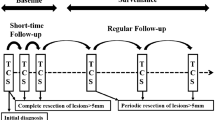Abstract
Eighty-two patients with colon and rectal polyps containing invasive adenocarcinoma treated by polypectomy alone were studied. Seven of 34 patients (21 percent) with sessile lesions had an adverse outcome, including five local recurrences and two distant metastases. They occurred from 4 to 68 months after the polypectomy. Forty-seven pedunculated polyps with invasion to the head (Level 1) or to the stalk (Level 3) and one polyp to the base of the stalk (Level 4) had no evidence of local recurrence or signs of metastasis. Twenty-eight percent of patients were found to have adenomatous polyps, and 4 percent had malignant polyps during the follow-up examinations (range, 3–119 months; mean, 53 months). The findings suggested that pedunculated polyps with invasion to the head (Level 1), neck (Level 2), or stalk (Level 3) can be safely treated with a complete polypectomy provided that the carcinoma is not undifferentiated. Sessile lesions as well as Level 4 pedunculated lesions should be treated aggressively. If resection is not performed, a long-term follow-up in these patients is essential.
Similar content being viewed by others
References
Nivatvongs S, Rojanasakul A, Reiman HM,et al. The risk of lymph node metastasis in colorectal polyps with invasive adenocarcinoma. Dis Colon Rectum 1991;34:323–8.
Haggitt RC, Glotzbach RE, Soffer EE, Wruble LD. Prognostic factors in colorectal carcinomas arising in adenomas: implications for lesions removed by endoscopic polypectomy. Gastroenterology 1985;89:328–36.
Morson BC, Whiteway JE, Jones EA, Macrae FA, Williams CB. Histopathology and prognosis of malignant colorectal polyps treated by endoscopic polypectomy. Gut 1984;25:437–44.
Coverlizza S, Risio M, Ferrari A, Fenoglio-Preiser CM, Rossini FP. Colorectal adenomas containing invasive carcinoma: pathologic assessment of lymph node metastatic potential. Cancer 1989;64:1937–47.
Christie JP. Polypectomy or colectomy? Management of 106 consecutively encountered colorectal polyps. Am Surg 1988;54:93–9.
Russell JB, Chu DZ, Russell MP, Chan CH, Thompson C, Schaefer RF. When is polypectomy sufficient treatment for colorectal cancer in a polyp? Am J Surg 1990;160:665–8.
Muto T, Sawada T, Sugihara K. Treatment of carcinoma in adenomas. World J Surg 1991;15:35–40.
Richards WO, Webb WA, Morris SJ,et al. Patient management after endoscopic removal of the cancerous colon adenoma. Ann Surg 1987;205:665–72.
Fucini C, Wolff BG, Spencer RJ. An appraisal of endoscopic removal of malignant colonic polyps. Mayo Clin Proc 1986;61:123–6.
Langer JC, Cohen Z, Taylor BR, Stafford S, Jeejeebhoy KN, Cullen JB. Management of patients with polyps containing malignancy removed by colonoscopic polypectomy. Dis Colon Rectum 1984;27:6–9.
Author information
Authors and Affiliations
Additional information
Read in part at the meeting of The American Society of Colon and Rectal Surgeons, St. Louis, Missouri, April 29 to May 4, 1990.
About this article
Cite this article
Pollard, C.W., Nivatvongs, S., Rojanasakul, A. et al. The fate of patients following polypectomy alone for polyps containing invasive carcinoma. Dis Colon Rectum 35, 933–937 (1992). https://doi.org/10.1007/BF02253494
Issue Date:
DOI: https://doi.org/10.1007/BF02253494




